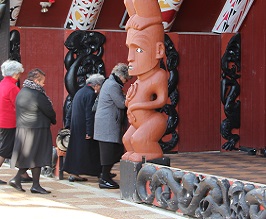What to expect at Youth Court
At the Youth Court
Young people who go to the Youth Court have what is called a "hearing". This is where the Judge hears their case. The young person will have a lawyer with them at their hearing. The Court will appoint a specialist youth lawyer called a Youth Advocate for free. However, the young person can also choose to pay for their own lawyer.
The Youth Advocate will contact the young person and their family/whānau before the hearing to talk about it and what to expect.
The Court may appoint a Lay Advocate to support the young person and their whānau/family in Court. Lay Advocates are people with mana or standing in the young person's community. They make sure that the Court understands any cultural matters to do with the case as well as representing the family’s views.
Te reo Māori, sign language and other languages
The young person or their parent, guardian or caregiver can talk in te reo Māori or any other language, including sign language. Tell your Youth Advocate, lawyer or Lay Advocate if you want to speak another language and they will arrange an interpreter with the Court for free.
What happens in the court room
Youth Court hearings are less formal than an adult court. For example, the Judge will call the young person by their first name and the court room is usually arranged in a more open and inclusive manner.
Because the public cannot be inside the Youth Court, the young person and their family/whānau only come into the court room when their name is called for the hearing.
When their hearing starts, the young person will be asked by the Judge whether or not they deny what the Police says they did.
If the young person denies the charge
- If the young person disagrees with the charge against them, that is called denying the charge.
- If they deny the charge the Judge will tell them a date to come back for a defended hearing.
At the defended hearing, the Police will have to prove that the young person did commit the offence.
If the Police do not prove the offence beyond reasonable doubt, the case will be dismissed and the young person’s court case is finished.
If the Police do prove beyond reasonable doubt that the young person committed the offence, the young person and their family/whānau will be part of a Family Group Conference to decide a plan for how the young person can take responsibility for what they did, as well as working out how to make sure the young person does not offend again.
If the young person admits the charge
If the young person admits the charge made against them, their case is sent to a youth justice coordinator. The coordinator will arrange a Family Group Conference to make a plan for how the young person can take responsibility for what they did, as well as working out how to make sure the young person does not offend again. The case will come back to Court after the Family Group Conference.
Find out more about Family Group Conferences on the website for Oranga Tamariki - Ministry for Children(external link).
What happens next
The Judge will review the plan that was made at the Family Group Conference and the young person will come back to Court regularly so the Judge can ensure they are completing the plan.
If the young person follows the plan
If the young person completes the plan that was developed at the Family Group Conference, the Judge will decide which Youth Court order is appropriate. There are a number of different options, including:
- A discharge as if the charge had never been laid. This means the young person has no criminal record and can enter adult life with a clean slate, a second chance.
- Other options include:
- An order that a discharge that will be noted on the young person’s record;
- An order to come to Court to be sentenced if called upon within one year;
- Disqualification from driving;
- Reparation;
- Community work;
- Supervision with or without some special activity;
- An order that time be spent in a secure Youth Justice Residence; or
- Conviction and transfer to the District Court for sentencing.
If the young person does not follow the plan
It is important that the young person follows and completes their plan. If they do not, the young person may receive a more serious outcome than they would have if they followed the plan.
Help to understand what is going on
The Youth Court process can be confusing. The Youth Advocate and Lay Advocate can help with any questions.
- The Youth Advocate is a trained lawyer who will be able to talk the young person through all of the legal aspects to their case.
- The Lay Advocate is a person with mana or standing in the young person's community. They help to make sure that the Court understands any cultural matters to do with the case as well as representing the family's views.
Young people and their family may also ask the Judge questions in Court. It is important that young people in Court understand, and are kept well-informed about what is happening.

